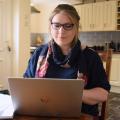
A scientist who achieved international recognition for his work and played an essential role in the discovery of an effective anti-cancer drug has died aged 80.
Professor Andrew James Thomson OBE, FRS, worked at the University of East Anglia (UEA) for more than four decades.
He was born in July 1940, in Steyning, Sussex, and after attending the local grammar school he went on to Oxford to study chemistry in 1959.
As both an undergraduate and postgraduate, he was strongly influenced by Professor R. J. P. Williams, who was among the first to recognise that metal atoms are vital to any animal or plant. This influence determined Dr Thomson’s subsequent scientific work, for which he later achieved international recognition.
The immediate result of his knowledge of the chemistry of platinum, gained during his doctoral work, was in 1966 when he was invited to join a group of biophysicists at Michigan State University in the United States of America.
The group had discovered that the electrolysis of a culture of E. coli bacteria disrupted their multiplication, an inhibition of cell growth that had significant implications for cancer therapy. It was therefore suspected that the active agent was a compound of platinum, but they needed a chemist to determine exactly what it was.
Dr Thomson solved the problem and found that it was a substance now known as CisPlatin, which has since become a valuable anti-cancer drug widely used today - especially in the treatment of testicular cancer.
He returned to England in 1967 and took up a junior post at the UEA. There he established a reputation as a research scientist of international standing leading to his election to the Fellowship of the Royal Society in 1993.
His work in the field of biochemical spectroscopy was recognised with several prestigious prizes and brought substantial research funds to UEA, such as a multi-million-pound grant from the Wellcome Foundation.

As a faculty member, he quickly rose through the ranks to professorship and head of the School of Chemistry where he established Pharmacy at UEA, first as a part of Chemistry and now as a successful school in its own right.
Later, as the first dean of science, he made changes that enhanced collaborations between the various schools. He played an important role as the representative of the UEA in the discussions which preceded the establishment of the Norwich Research Park. And in 2008 he was awarded an OBE for services to higher education.

Dr Thomson remained loyal to the UEA for more than four decades, until his retirement in 2008. Even after, as Emeritus Professor, he remained closely involved with the university in many different ways right up to his unexpected death.
He was also a founding member of the Inorganic Biochemistry Discussion Group, founded in 1975 to encourage teaching and research.
Nick Le Brun, professor of Biological Chemistry at the UEA, is one of many people who has paid tribute to Dr Thomson.
He said: “Andrew was a friend, a mentor, and a great supporter - to me and many others in the UK and beyond. He was a giant of biological inorganic chemistry, a true pioneer. I will miss him greatly.”

He has also been described as a “passionate and supportive scientist” by many more professionals who worked alongside him.
A statement from the UEA’s School of Chemistry said: “Andrew was well known to many in the School.
“He was much more than a colleague to many - he was a friend, a mentor, and a great supporter.
“He was a scientist of the highest order, a giant of biological inorganic chemistry, a true pioneer. He will be missed tremendously.”

Away from his work, Dr Thomson enjoyed hiking, dancing, singing, and performing.
He leaves behind his wife Anne, who he married in 1966, their two sons, and four grandchildren.
Donations in his memory can be made to Cancer Research UK and the Critical Care Unit at County Hospital here.
A private celebration of his life will be held later this month at Greenacres, Colney. For more information, contact Peter Taylor Funeral Directors on 01603 760787.



Comments: Our rules
We want our comments to be a lively and valuable part of our community - a place where readers can debate and engage with the most important local issues. The ability to comment on our stories is a privilege, not a right, however, and that privilege may be withdrawn if it is abused or misused.
Please report any comments that break our rules.
Read the rules here